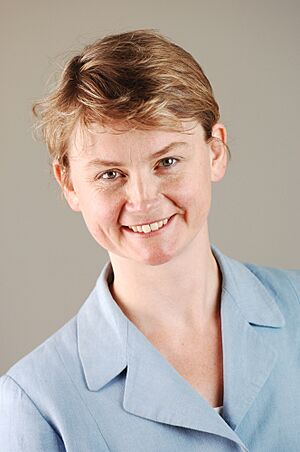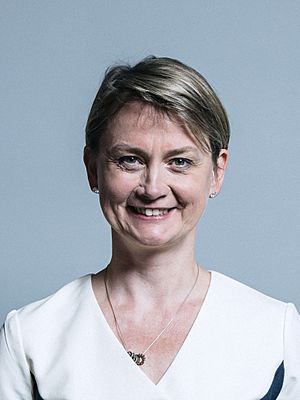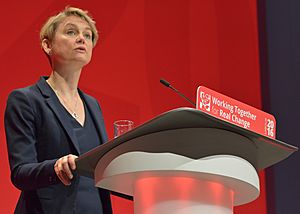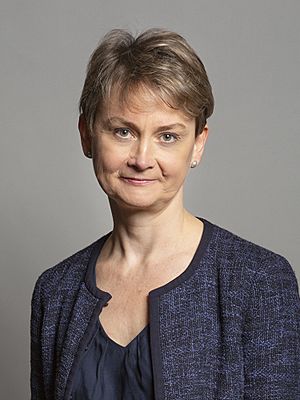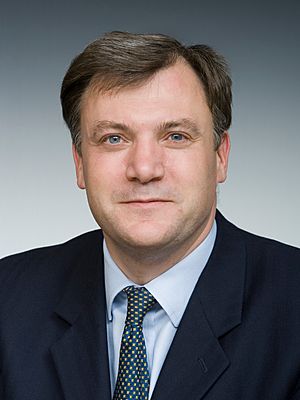Yvette Cooper facts for kids
Quick facts for kids
Yvette Cooper
|
|||||||||||||||||
|---|---|---|---|---|---|---|---|---|---|---|---|---|---|---|---|---|---|
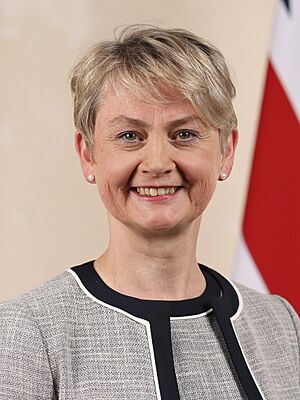
Official portrait, 2024
|
|||||||||||||||||
| Secretary of State for Foreign, Commonwealth and Development Affairs | |||||||||||||||||
| Assumed office 5 September 2025 |
|||||||||||||||||
| Prime Minister | Keir Starmer | ||||||||||||||||
| Preceded by | David Lammy | ||||||||||||||||
| Home Secretary | |||||||||||||||||
| In office 5 July 2024 – 5 September 2025 |
|||||||||||||||||
| Prime Minister | Keir Starmer | ||||||||||||||||
| Preceded by | James Cleverly | ||||||||||||||||
| Succeeded by | Shabana Mahmood | ||||||||||||||||
| Chair of the Home Affairs Select Committee | |||||||||||||||||
| In office 19 October 2016 – 1 December 2021 |
|||||||||||||||||
| Preceded by | Keith Vaz | ||||||||||||||||
| Succeeded by | Diana Johnson | ||||||||||||||||
| Secretary of State for Work and Pensions | |||||||||||||||||
| In office 5 June 2009 – 11 May 2010 |
|||||||||||||||||
| Prime Minister | Gordon Brown | ||||||||||||||||
| Preceded by | James Purnell | ||||||||||||||||
| Succeeded by | Iain Duncan Smith | ||||||||||||||||
| Chief Secretary to the Treasury | |||||||||||||||||
| In office 24 January 2008 – 5 June 2009 |
|||||||||||||||||
| Prime Minister | Gordon Brown | ||||||||||||||||
| Preceded by | Andy Burnham | ||||||||||||||||
| Succeeded by | Liam Byrne | ||||||||||||||||
|
|||||||||||||||||
|
|||||||||||||||||
| Member of Parliament for Pontefract, Castleford and Knottingley Normanton, Pontefract and Castleford (2010–2024) Pontefract and Castleford (1997–2010) |
|||||||||||||||||
| Assumed office 1 May 1997 |
|||||||||||||||||
| Preceded by | Geoffrey Lofthouse | ||||||||||||||||
| Majority | 6,630 (18.4%) | ||||||||||||||||
| Personal details | |||||||||||||||||
| Born | 20 March 1969 Inverness, Scotland |
||||||||||||||||
| Political party | Labour | ||||||||||||||||
| Spouse | |||||||||||||||||
| Children | 3 | ||||||||||||||||
| Parent | Tony Cooper (father) | ||||||||||||||||
| Education | |||||||||||||||||
| Signature | |||||||||||||||||
Yvette Cooper, born on March 20, 1969, is an important British politician. She is currently the Foreign Secretary for the UK, a role she started in September 2025. Before this, she was the Home Secretary from 2024 to September 2025.
As a member of the Labour Party, Yvette Cooper has been a Member of Parliament (MP) since 1997. An MP is someone elected by people in their local area to represent them in the UK Parliament. She represents the area of Pontefract, Castleford and Knottingley.
Throughout her career, Yvette Cooper has held many significant roles in government. She worked under Prime Ministers Tony Blair and Gordon Brown. She was also part of the "Shadow Cabinet," which is a group of opposition MPs who challenge the government.
In 2024, after the Labour Party won the general election, Prime Minister Keir Starmer appointed her as Home Secretary. She then became Foreign Secretary in September 2025. Yvette Cooper is the first woman in British history to have held both of these very important jobs.
Contents
- About Yvette Cooper's Early Life and Education
- Yvette Cooper's Time in Parliament
- Yvette Cooper's Personal Life
- See also
About Yvette Cooper's Early Life and Education
Yvette Cooper was born in Inverness, Scotland, on March 20, 1969. Her father, Tony Cooper, was a leader in a trade union and advised the government on energy. Her mother, June, was a maths teacher.
Yvette went to school at Eggar's School and Alton College in Hampshire. She then studied philosophy, politics and economics at Balliol College, Oxford, where she earned a top degree. She also studied at Harvard University in the United States and later earned a master's degree in economics from the London School of Economics.
Starting Her Career Journey
Yvette Cooper started her career in 1990, researching economic policies for a politician named John Smith. She even worked in the United States for Bill Clinton during his presidential campaign in 1992. After that, she advised another politician, Harriet Harman, on policy.
When she was 24, Yvette Cooper became unwell with chronic fatigue syndrome and took a year to get better. Later, she worked as a researcher and then became a main economics reporter for The Independent newspaper. She stayed there until she was elected to Parliament in 1997.
Yvette Cooper's Time in Parliament
Becoming a Member of Parliament
In 1997, Yvette Cooper was chosen by the Labour Party to run for election in the area of Pontefract and Castleford. She won the election and became an MP. Her first speech in Parliament was about helping people in her area find jobs. She also worked on a committee focused on education and employment.
Working in Government Roles
From 1999 to 2010, Yvette Cooper held several important jobs in the government under Prime Ministers Tony Blair and Gordon Brown.
- She worked in the Department of Health, helping with programs like Sure Start which supports young children and families. She was also the first British minister to take maternity leave.
- She helped with projects to improve areas that used to have coal mines.
- She became the Minister of State for Housing and Planning, focusing on housing issues. She talked about the need for more affordable homes across the country.
- In 2008, she became the Chief Secretary to the Treasury, helping manage the country's money. She was the first woman to hold this role. Her husband, Ed Balls, was also a minister, making them the first married couple to serve in the Cabinet at the same time.
- In 2009, she became the Secretary of State for Work and Pensions. In this role, she worked on policies related to jobs and support for people.
Rules for MPs' Expenses
In 2009, there was a review of how MPs claimed expenses for their homes. Yvette Cooper and her husband, Ed Balls, were part of this review. An official investigation found that they had followed the rules and were not trying to make money unfairly. However, like many other MPs, they were asked to repay a small amount of money due to overpayments related to their mortgage. They repaid this amount.
Working in the Shadow Cabinet
After the 2010 general election, Yvette Cooper was re-elected as an MP for a new area, Normanton, Pontefract, and Castleford. When the Labour Party was not in government, she joined the "Shadow Cabinet." This group of opposition MPs checks the work of government ministers.
- She first became the Shadow Foreign Secretary, speaking for the Labour Party on international matters.
- Later, she became the Shadow Home Secretary, focusing on issues like policing and national security. Her husband, Ed Balls, also held a senior role in the Shadow Cabinet at this time.
- She also served as the Shadow Minister for Women and Equalities, working on fairness for everyone.
As Shadow Home Secretary
As Shadow Home Secretary, Yvette Cooper kept a close eye on the government's work in areas like law and order. She spoke out on various issues, including:
- Suggesting a new role to help tackle domestic violence.
- Highlighting concerns about how some migrant workers were treated.
- Criticizing government plans that she believed would make it harder for working parents to support their children.
She was recognized as one of the most influential women in the UK during this time.
Running for Labour Party Leader
After the 2015 general election, Yvette Cooper was re-elected as an MP. When the leader of the Labour Party stepped down, she decided to run to become the new leader. During her campaign, she talked about her ideas for the country. These included:
- Creating more skilled jobs in manufacturing.
- Ensuring social care workers earned a living wage.
- Building many new homes each year.
She received support from many people, including former Prime Minister Gordon Brown. She came third in the election.
Working as a Backbencher
After the leadership election, Yvette Cooper became a "backbencher." This means she was still an MP but didn't hold a top government or Shadow Cabinet job.
- She focused on helping with the European refugee crisis, working to find good ways to support refugees.
- In 2016, she was chosen to lead the Home Affairs Select Committee. This committee looks closely at the work of the Home Office, which deals with things like policing and immigration.
- As chair, she looked into public opinions on immigration. She also spoke out about a program for child refugees.
- She was re-elected as an MP in both the 2017 and 2019 general elections.

Her Role in Brexit Discussions
During the time the UK was leaving the European Union, known as Brexit, Yvette Cooper played an active role. She worked to prevent a "no-deal" Brexit, which meant leaving without an agreement. She introduced a special bill in Parliament that helped ensure a smoother process for the UK's departure.
Back in the Shadow Cabinet
In November 2021, Keir Starmer, the leader of the Labour Party, asked Yvette Cooper to become the Shadow Home Secretary again. In this role, she continued to oversee the government's actions on national security and law enforcement. She also spoke about the importance of ministers following rules for handling sensitive information.
Serving as Home Secretary (2024-2025)
In July 2024, after the Labour Party won the general election, Yvette Cooper was appointed Home Secretary by Prime Minister Keir Starmer. This is a very important job, responsible for national security, policing, and immigration.
- One of her first actions was to create a new Border Security Command. This team works to manage borders and stop illegal crossings.
- She responded to a serious incident in Southport in 2024, where she visited the community and later announced a public inquiry to find answers about what happened. She also worked with the Prime Minister to review laws related to extreme violence.
- She introduced new laws to strengthen border security and manage asylum claims. These plans aimed to make the system fairer and more effective.
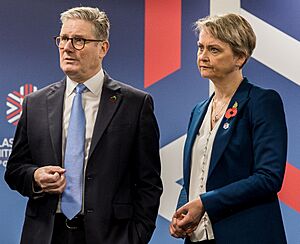
Becoming Foreign Secretary (2025-Present)
On September 5, 2025, Yvette Cooper was appointed Foreign Secretary. In this role, she represents the UK on the world stage, working with other countries on international issues. This is one of the most senior positions in the government.
Yvette Cooper's Personal Life
Yvette Cooper married fellow politician Ed Balls on January 10, 1998. Ed Balls has also held important roles in government and in the Shadow Cabinet. They have three children together.
She has written two books: She Speaks: The Power of Women's Voices and She Speaks: Women's Speeches That Changed the World, from Pankhurst to Greta.
See also
 In Spanish: Yvette Cooper para niños
In Spanish: Yvette Cooper para niños
 | Janet Taylor Pickett |
 | Synthia Saint James |
 | Howardena Pindell |
 | Faith Ringgold |


